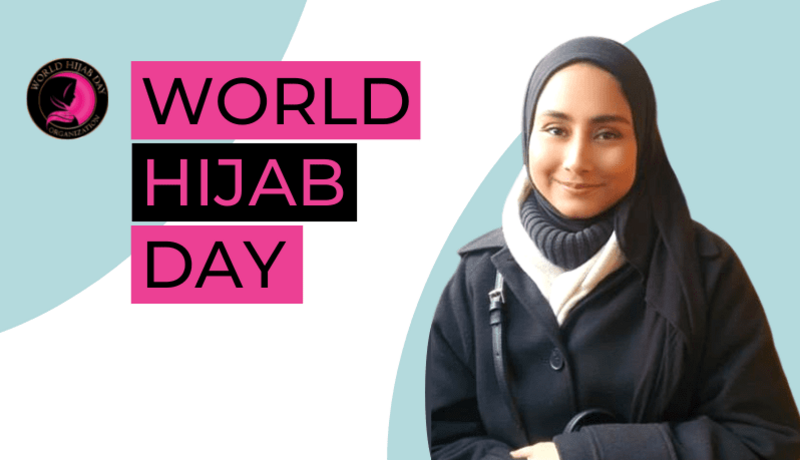Personal Perspective | World Hijab Day with Hannah Khatun
Posted on February 2023

For World Hijab Day, we heard from Hannah Khatun, Consultant for our Healthcare Commissioning & Operations team, about what wearing the Hijab means to her.
The Hijab is a symbol of my faith and a very strong message about who I am; if I’m out and about, anyone who sees me will instantly know I’m a practicing Muslim.
I started wearing the Hijab when I reached puberty and was considered a woman. It’s viewed as a beautiful thing where you are now engaging with your faith more independently and taking responsibility for your actions. Hijab is more than just the scarf on my head, it’s also the actions I do, the way I speak, what’s in my heart, my character and intentions. People associate the Hijab with women only, but men also have the same duty in terms of their respectful actions, even if it’s not as noticeable in their attire.
Wearing the Hijab is also a means of remembrance. If I see an older person struggling to go up the stairs, it’s easy to just ignore it and do my own thing. But when I’m wearing a Hijab it’s a reminder to be a reflection of my religion, like the voice in someone’s head of their mum telling them off if they do something wrong! I know it will please my Creator if I’m acting in a certain way and it’s also good that my actions benefit other people. Not only that, but someone else might see me helping and it will change their negative idea of what a Hijabi woman is like; it’s a domino reaction.
“Hijab is more than just the scarf on my head, it’s also the actions I do, the way I speak, what’s in my heart, my character and intentions.”
When I went to Turkey on my honeymoon last Summer, their cultural norms meant it was probably the most comfortable I’ve ever felt in my Hijab. I didn’t feel like people were staring or hesitant to approach me, it made me realise first-hand the effect that culture has on how someone of a particular faith is perceived. In the Western world, with its own social norms and where you don’t often see Hijabi representation in the media, choosing to wear the Hijab is a way that I can create space for my identity and have control over what I feel most happy wearing.
I went to a Catholic school as a teenager because my parents thought it would be good to meet people from different backgrounds and religions as a way to educate myself. I didn’t actually go straight into the deep end with wearing my Hijab full-time until I left school, I began by wearing it more at family gatherings and weekend outings with my friends. As a teenager, where you often follow the crowd and various trends, having a gradual process of wearing it allowed me to build my own thoughts on what the Hijab meant to me and strengthen who I wanted to be and how I wanted to dress more modestly after I left secondary school.
“It’s also a misconception to think that women don’t have a voice when they are wearing a Hijab, or that they’re reserved and can’t fight for themselves… When I see a Hijabi, I see someone who is strong.”
There’s this conception that if you wear the Hijab it must be because your parents told you to, but my parents left it to my choice. My mum was surprised because I tried to wear it way before my puberty when I saw my older relatives wearing it and wanted to take part. It’s also a misconception to think that women don’t have a voice when they are wearing a Hijab, or that they’re reserved and can’t fight for themselves. If anything, I’m the person that voices my opinion the most in our house; if you were to speak to my mum, she would say that I was more challenging than my brothers. When I see a Hijabi, I see someone who is strong.
It’s heartbreaking to see the struggle of women in Iran who are being forced to wear the Hijab, ultimately everyone’s journey is different. There are oppressive ideas around it in the East, just as there have been in the West also, with women being made to take off their scarves as part of the law in some countries. I have built such a love for the Hijab and I’ve never been forced to wear it, so I can’t imagine the torment women in Iran are associating with it. It’s painful for me that this forcefulness is causing people to hate it and think that the force comes from the religion; it should be understood that there is a separation between culture and religion in this instance. I’m still making mistakes, but I’m progressing and learning about how I can better my Hijab individually. The Hijab should always be seen as a reflection of character, not just reduced to a piece of clothing on the head.
Recent Articles
-
Will Pardoe | Improving Offer Acceptance: The Importance of the Interview Experience
Having a strong shortlist of well-qualified candidates is only part of the hiring process; there ...
9 days ago -
Case Study: Supporting Trustees of The London Clinic with Critical Interim EBME Engineers
When The London Clinic faced the sudden departure of three in-house EBME Engineers, their leader...
15 days ago -
Nik Stoate | How to stand out in a tough market
What you can control when hiring local government lawyersIn today's challenging and competitive ...
24 days ago